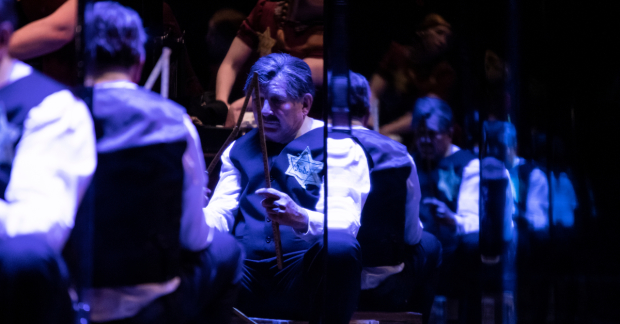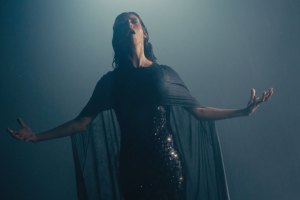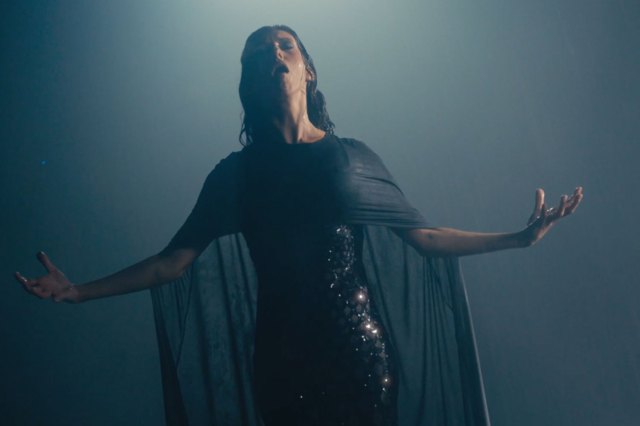Review: The Seven Streams of the River Ota (National Theatre)
Robert Lepage’s show returns to London to mark 75 years since the nuclear bombing of Hiroshima

© Elias Djemil-Matassov
That magician of theatre Robert Lepage does things on stage that are on the surface entirely contradictory: he creates works on an epic scale that are full of detail; he makes pieces about the sweep of history that are grounded in the domestic; he is both extremely funny and deeply serious, visually sumptuous yet simple.
The power of his imagination – and that of his company Ex Machina – makes the seven hours that it takes to tell this story of a group of loosely related people that begins in Hiroshima in 1945 and ends in the same place in 1999, pass by in what seems like the blink of the eye. It is engrossing, absorbing and constantly changing.
It starts with the love affair between a woman hideously scarred by the results of the atomic bomb and an American GI, who has been sent to photograph the "physical damage" caused. "I thought you would take a picture of me", she says, plaintively, as he turns his camera from her face to the state of the building around her. The results of their fleeting liaison, born of guilt and grief, is a son who – with his American brother and his Japanese sister, blinded in the explosion – provide the glue that binds the seven sections together.
So does the physical shape of the stage: the long low terrace of the Japanese house, sitting at the source of the seven streams of the Ota, with its delicate screen doors and a garden of stones is transformed into an American boarding house, where residents pile into a shared bathroom, an Osaka train station in 1970, the Amsterdam red light district and a Zen temple. In that time, the action encompasses unwanted pregnancies, assisted suicide, the Aids epidemic, the work of George Feydeau and Yukio Mishima, and the Theresienstadt concentration camp.
It also wraps in its baggy, humane embrace vast themes, most particularly about the way that history and individual lives are touched by the act of translation – into art, into books, into plays. There are repeated references to Madam Butterfly and one transfixing moment when her great aria is sung in a mirrored room of memory which recalls the concentration camp. Photographs run through the play's length: their power to record truth, but also to distort. Plays, too: Japanese theatre techniques and little moments of dance.
The production is full of experimental daring – conceits that are now regularly used in theatre but were radically different in 1994, when the play first appeared. The use of video, of photographs, of the Japanese percussion that underlies the action and punctuates the text are all still striking. So is the way that a translator suddenly appears in one section, interpreting what the French-speaking characters are saying. Or a nurse who records conversations in a café so that only some are heard.
But all these conceits and themes rise and bubble through a drama that has the gentle rhythms of life lived. For all its vast ambition, Seven Streams never loses sight of the fallibility and lovability of human beings: one plot strand involves a philandering Quebecois diplomat and his disaffected and unhappy wife. They are very funny, but never quite held up to ridicule. In contrast, the first section closes with a scene in which an Aids victim ends his life: it is almost unbearably grave, slow and poignant to witness, and full of love.
Each scene moves into the other with fluid grace; the scene changes take the breath away but so does the acting, with ten people filling every role with utter conviction. Not everything absolutely works, but the play is full of vivid moments that catch the attention even as it moves on.
When I interviewed him at the National last week (shortly to be available as a podcast and well worth a listen) Lepage said the single starting point for this massive piece (developed over many years) was a story about a Hiroshima survivor with a terribly scarred face, using a tiny mirror to put on lipstick. That truth finds a fictional echo here; but there are many more, rippling down the years as the stories pull you onwards, making you listen, making you understand. In the final analysis, The Seven Streams of the River Ota is a testament to the way art can increase compassion and understanding. I can't imagine loving anything better this year.




















